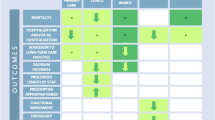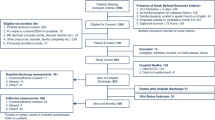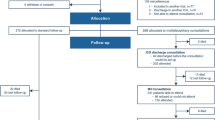Abstract
Purpose
Delirium is a common neurocognitive complication in cancer. Despite this, the studies examining the trajectory of the severity of delirium symptoms and its impact on health outcome in gastric cancer is rather limited. This study examined the trajectory of delirium symptom severity (DSS) following resection surgery for gastric cancer and its prospective association with cognitive function.
Methods
A three-wave prospective observational study was conducted with 242 gastric cancer patients admitted for resection surgery at a teaching hospital in South Korea from May 2016 to November 2017. DSS was assessed by the clinical staff before and 1, 2, 3, and 7 days after surgery using the Delirium Rating Scale-Revised-98. A survey including the Functional Assessment of Cancer Therapy-Cognitive Scale (FACT-Cog) and Mini-Mental State Examination (MMSE) was administered before surgery (T0), 7 days after (T1), and 3 to 6 months after surgery (T2).
Results
Out of 242 participants, 48.8% (118) completed the survey at all three time points, 43.4% (105) did so for two time points, and 7.9% (19) for one time point. No cases of full delirium were observed over four postoperative time points. Latent growth curve modeling analyses indicated that DSS declined over 3 days after surgery. Age and anesthesia time were positively associated with the initial level of DSS. A medication history for memory complaints was related to a slower recovery from delirium symptoms. While the use of propofol as an anesthetic agent was associated with lower initial DSS, it predicted a slower recovery from DSS. A higher initial DSS predicted a lower T1 MMSE score.
Conclusions
Severity of postoperative delirium symptoms predicts a short-term and objective cognitive function post-surgery. Monitoring and timely treatment of postoperative delirium symptoms is needed to diminish cognitive consequences in gastric cancer patients.


Similar content being viewed by others
References
Lawlor PG, Bush SH (2015) Delirium in patients with cancer: assessment, impact, mechanisms and management. Nat Rev Clin Oncol 12(2):77–92
Bruera E, Bush SH, Willey J, Paraskevopoulos T, Li Z, Palmer JL, Cohen MZ, Sivesind D, Elsayem A (2009) Impact of delirium and recall on the level of distress in patients with advanced cancer and their family caregivers. Cancer 115(9):2004–2012
Ouimet S, Riker R, Bergeon N, Cossette M, Kavanagh B, Skrobik Y (2007) Subsyndromal delirium in the ICU: evidence for a disease spectrum. Intensive Care Med 33(6):1007–1013
Shim J, DePalma G, Sands LP, Leung JM (2015) Prognostic significance of postoperative subsyndromal delirium. Psychosomatics 56(6):644–651
MacLullich AM, Beaglehole A, Hall RJ, Meagher DJ (2009) Delirium and long-term cognitive impairment. Int Rev Psychiatry 21(1):30–42
Girard TD, Jackson JC, Pandharipande PP, Pun BT, Thompson JL, Shintani AK, Gordon SM, Canonico AE, Dittus RS, Bernard GR (2010) Delirium as a predictor of long-term cognitive impairment in survivors of critical illness. Crit Care Med 38(7):1513–1520
Basinski JR, Alfano CM, Katon WJ, Syrjala KL, Fann JR (2010) Impact of delirium on distress, health-related quality of life, and cognition 6 months and 1 year after hematopoietic cell transplant. Biol Blood Marrow Transplant 16(6):824–831
Fann JR, Alfano CM, Roth-Roemer S, Katon WJ, Syrjala KL (2007) Impact of delirium on cognition, distress, and health-related quality of life after hematopoietic stem-cell transplantation. J Clin Oncol 25(10):1223–1231
Bray F, Ferlay J, Soerjomataram I, Siegel RL, Torre LA, Jemal A (2018) Global cancer statistics 2018: GLOBOCAN estimates of incidence and mortality worldwide for 36 cancers in 185 countries. CA: a Cancer journal for clinicians
Kim AR, Cho J, Hsu Y-J, Choi MG, Noh JH, Sohn TS, Bae JM, Yun YH, Kim S (2012) Changes of quality of life in gastric cancer patients after curative resection: a longitudinal cohort study in Korea. Ann Surg 256(6):1008–1013
Park J, Kwon Y (1989) Standardization study of the Korean version of the mini-mental state examination (MMSE-K) for older adults -part II: cutoffs and diagnostic validity. J Korean Neurol Assoc 28(3):508–513
Trzepacz PT, Mittal D, Torres R, Kanary K, Norton J, Jimerson N (2001) Validation of the delirium rating scale-revised-98: comparison with the delirium rating scale and the cognitive test for delirium. J Neuropsychiatry Clin Neurosci 13(2):229–242
Meagher D, Adamis D, Trzepacz P, Leonard M (2012) Features of subsyndromal and persistent delirium. Br J Psychiatry 200(1):37–44
Wagner LI, Sweet J, Butt Z, Lai J-S, Cella D (2009) Measuring patient self-reported cognitive function: development of the functional assessment of cancer therapy-cognitive function instrument. J Support Oncol 7(6):W32–W39
Park J-H, Bae SH, Jung YS, Jung Y-M (2015) The psychometric properties of the Korean version of the functional assessment of cancer therapy-cognitive (FACT-cog) in Korean patients with breast cancer. Support Care Cancer 23(9):2695–2703
Folstein MF, Folstein SE, McHugh PR (1975) “Mini-mental state”: a practical method for grading the cognitive state of patients for the clinician. J Psychiatr Res 12(3):189–198
Oh SM, Min KJ, Park DB (1999) A study on the standardization of the hospital anxiety and depression scale for Koreans: a comparison of normal, depressed and anxious groups. J Korean Neurol Assoc 38(2):289–296
Quan H, Sundararajan V, Halfon P, Fong A, Burnand B, Luthi J-C, Saunders LD, Beck CA, Feasby TE, Ghali WA (2005) Coding algorithms for defining comorbidities in ICD-9-CM and ICD-10 administrative data. Med Care 43:1130–1139
Preacher KJ (2010) Latent growth curve models. In: Hancock GR, Mueller RO (eds) The reviewer's guide to quantitative methods in the social sciences. Routledge, New York, pp 185–198
Schreiber JB, Nora A, Stage FK, Barlow EA, King J (2006) Reporting structural equation modeling and confirmatory factor analysis results: a review. J Educ Res 99(6):323–338
Bentler PM (1990) Comparative fit indexes in structural models. Psychol Bull 107(2):238–246
Kenny DA, Kaniskan B, McCoach DB (2015) The performance of RMSEA in models with small degrees of freedom. Sociol Methods Res 44(3):486–507
Katai H, Sasako M, Sano T, Fukagawa T (2004) Gastric cancer surgery in the elderly without operative mortality. Surg Oncol 13(4):235–238
Cole MG, McCusker J, Voyer P, Monette J, Champoux N, Ciampi A, Vu M, Belzile E (2011) Subsyndromal delirium in older long-term care residents: incidence, risk factors, and outcomes. J Am Geriatr Soc 59(10):1829–1836
Takeuchi M, Takeuchi H, Fujisawa D, Miyajima K, Yoshimura K, Hashiguchi S, Ozawa S, Ando N, Shirahase J, Kitagawa Y (2012) Incidence and risk factors of postoperative delirium in patients with esophageal cancer. Ann Surg Oncol 19(12):3963–3970
Tei M, Wakasugi M, Kishi K, Tanemura M, Akamatsu H (2016) Incidence and risk factors of postoperative delirium in elderly patients who underwent laparoscopic surgery for colorectal cancer. Int J Color Dis 31(1):67–73
Veliz-Reissmüller G, Torres HA, van der Linden J, Lindblom D, Jönhagen ME (2007) Pre-operative mild cognitive dysfunction predicts risk for post-operative delirium after elective cardiac surgery. Aging Clin Exp Res 19(3):172–177
Nishikawa K, Nakayama M, Omote K, Namiki A (2004) Recovery characteristics and post-operative delirium after long-duration laparoscope-assisted surgery in elderly patients: propofol-based vs. sevoflurane-based anesthesia. Acta Anaesthesiol Scand 48(2):162–168
Royse C, Andrews D, Newman S, Stygall J, Williams Z, Pang J, Royse A (2011) The influence of propofol or desflurane on postoperative cognitive dysfunction in patients undergoing coronary artery bypass surgery. Anaesthesia 66(6):455–464
Shin Y-H, Kim D-K, Jeong H-J (2015) Impact of surgical approach on postoperative delirium in elderly patients undergoing gastrectomy: laparoscopic versus open approaches. Korean J Anesthesiol 68(4):379–385
Saczynski JS, Marcantonio ER, Quach L, Fong TG, Gross A, Inouye SK, Jones RN (2012) Cognitive trajectories after postoperative delirium. N Engl J Med 367(1):30–39
Baumbach P, Meissner W, Guenther A, Witte O, Götz T (2016) Perceived cognitive impairments after critical illness: a longitudinal study in survivors and family member controls. Acta Anaesthesiol Scand 60(8):1121–1130
Poppelreuter M, Weis J, Külz A, Tucha O, Lange K, Bartsch H (2004) Cognitive dysfunction and subjective complaints of cancer patients: a cross-sectional study in a cancer rehabilitation Centre. Eur J Cancer 40(1):43–49
Breitbart W, Alici Y (2012) Evidence-based treatment of delirium in patients with cancer. J Clin Oncol 30(11):1206–1214
Neufeld KJ, Yue J, Robinson TN, Inouye SK, Needham DM (2016) Antipsychotic medication for prevention and treatment of delirium in hospitalized adults: a systematic review and meta-analysis. J Am Geriatr Soc 64(4):705–714
Burry L, Mehta S, Perreault MM, Luxenberg JS, Siddiqi N, Hutton B, Fergusson DA, Bell C, Rose L (2018) Antipsychotics for treatment of delirium in hospitalised non-ICU patients. Cochrane Database Syst Rev (6). https://doi.org/10.1002/14651858.CD005594.pub3
Gagnon P, Allard P, Gagnon B, Mérette C, Tardif F (2012) Delirium prevention in terminal cancer: assessment of a multicomponent intervention. Psycho-Oncology 21(2):187–194
Siddiqi N, Harrison JK, Clegg A, Teale EA, Young J, Taylor J, Simpkins SA (2016) Interventions for preventing delirium in hospitalised non-ICU patients. The Cochrane Library
Hshieh TT, Yue J, Oh E, Puelle M, Dowal S, Travison T, Inouye SK (2015) Effectiveness of multicomponent nonpharmacological delirium interventions: a meta-analysis. JAMA Intern Med 175(4):512–520
Martinez FT, Tobar C, Beddings CI, Vallejo G, Fuentes P (2012) Preventing delirium in an acute hospital using a non-pharmacological intervention. Age Ageing 41(5):629–634
Leung JM, Sands LP, Mullen EA, Wang Y, Vaurio L (2005) Are preoperative depressive symptoms associated with postoperative delirium in geriatric surgical patients? J Gerontol Ser A Biol Med Sci 60(12):1563–1568
Marchington KL, Carrier L, Lawlor PG (2012) Delirium masquerading as depression. Palliat Support Care 10(1):59–62
Funding
This study was supported by a grant of the Korean Mental Health Technology R & D Project, Ministry of Health & Welfare, Republic of Korea (HM15C1224).
Author information
Authors and Affiliations
Corresponding author
Ethics declarations
Conflicts of interest
The authors declare that they have no conflict of interest.
We have full control of all primary data and we agree to allow the journal to review their data if requested.
Research involving human participants and/or animals
“All procedures performed in studies involving human participants were in accordance with the ethical standards of the institutional and/or national research committee and with the 1964 Helsinki declaration and its later amendments or comparable ethical standards.”
Informed consent
Informed consent was obtained from all individual participants included in the study.
Additional information
Publisher’s Note
Springer Nature remains neutral with regard to jurisdictional claims in published maps and institutional affiliations.
Electronic supplementary material
ESM 1
(DOCX 21 kb)
Rights and permissions
About this article
Cite this article
Shim, EJ., Noh, H.L., Lee, KM. et al. Trajectory of severity of postoperative delirium symptoms and its prospective association with cognitive function in patients with gastric cancer: results from a prospective observational study. Support Care Cancer 27, 2999–3006 (2019). https://doi.org/10.1007/s00520-018-4604-4
Received:
Accepted:
Published:
Issue Date:
DOI: https://doi.org/10.1007/s00520-018-4604-4




